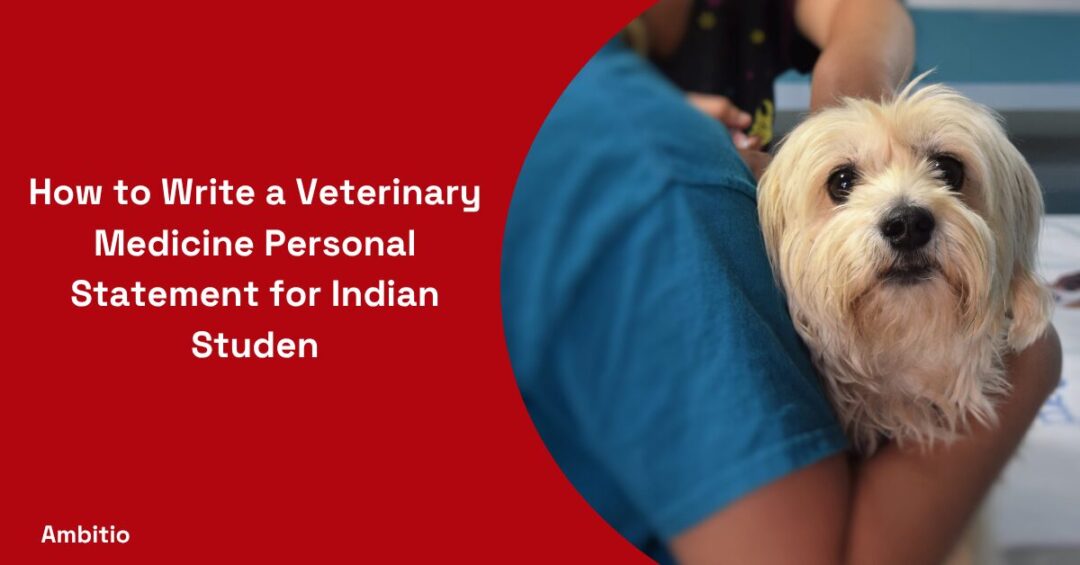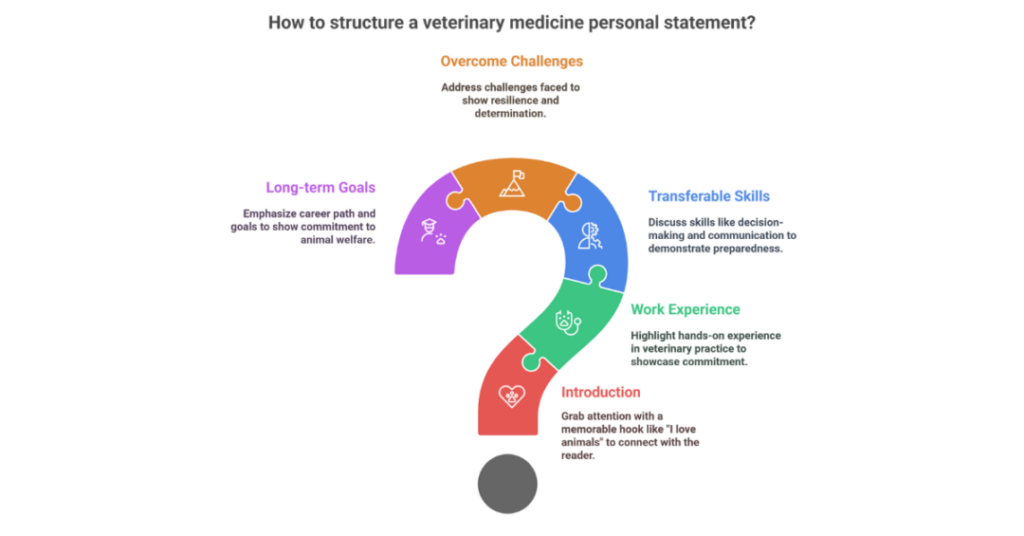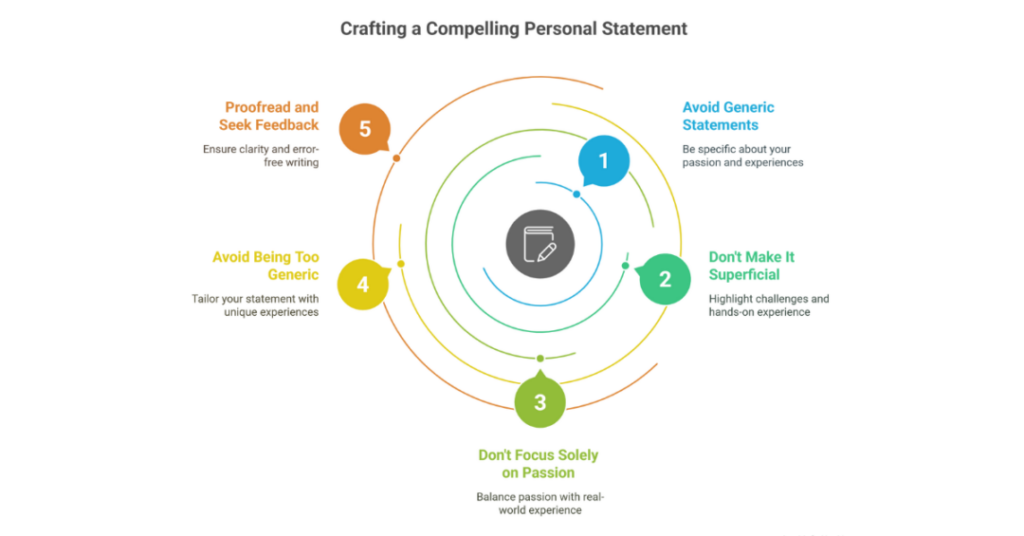5 June 2025
8 minutes read
How to Write a Veterinary Medicine Personal Statement for Indian Students?

Key Takeaways
- A veterinary medicine personal statement should highlight your hands-on experience and real-world veterinary work to demonstrate your commitment and readiness for vet school.
- Emphasize your academic achievements, problem-solving skills, and long-term career goals to show personal growth and dedication to veterinary medicine.
- Craft a concise, well-written statement that is free of grammatical errors, tailored to reflect your individuality, and avoids generic statements to make a lasting impression.
Writing a veterinary medicine personal statement can be the hardest part of your application. With hundreds of applicants vying for a spot in veterinary school, standing out is crucial. Many Indian students face challenges like cultural differences, limited veterinary experience, and pressure to prove they “love animals.”
To stand out, focus on showcasing hands-on work experience, problem-solving abilities, and transferable skills. A well-tailored, concise personal statement that highlights your passion for veterinary science and unique experiences will prove you’re the right fit for vet school.
What is a Veterinary Medicine Personal Statement and why does it matter?
A veterinary medicine personal statement for university applications is your chance to demonstrate why you want to be a vet and why you’re a good candidate for veterinary school. For Indian students, it’s crucial to highlight your passion for animal welfare, relevant work experience in veterinary practice, and volunteer roles.
Whether at a zoo, kennel, or rescue centre, showcasing hands-on experience helps you stand out. Tailor your statement to reflect your unique achievements, decision-making abilities, and long-term career in the veterinary profession.
How to Structure A Veterinary Medicine Personal Statement for Vet Admission?
A strong veterinary medicine personal statement is essential for standing out in a competitive field. For Indian students applying through UCAS or other channels, crafting an impactful personal statement is crucial.

Here’s what a strong personal statement should include:
Introduction: Grab Attention Early
Start by stating your passion for animals and your desire to become a veterinarian. Use a memorable hook like “I love animals” to immediately connect with the reader.
Discuss Your Academic Achievements
Highlight your academic background, including your IELTS, TOEFL, GRE, or GMAT scores if applicable. Discuss how your GPA supports your candidacy. Mention any scholarships for international students you’ve received or aim for, and reference universities like The University of Edinburgh, University of Ghent, or Texas A&M University to show you’ve done your research.
Highlight Relevant Work Experience
Mention your hands-on experience in veterinary practice, whether with small animals, at a cattery, or through volunteer work at pig or poultry farms. These experiences showcase your commitment to the profession and help you stand out from other applicants.
Showcase Transferable Skills
Discuss key skills like decision-making, communication, and your ability to work in stable environments. These will highlight your preparedness for the challenges of veterinary medicine and make your application more compelling.
Explain How You’ve Overcome Challenges
Address any challenges you’ve faced in pursuing a veterinary career, such as overcoming academic hurdles, language barriers, or finding unique research opportunities.
Conclude with Long-term Goals
End by emphasizing your career path and goals, whether you plan to pursue a DVM or medical school, and how this program will help you grow professionally. Tailor it to show your commitment to animal welfare and the veterinary profession.
Make sure to proofread your veterinary medicine personal statement thoroughly to avoid grammatical errors. Follow personal statement advice to ensure it aligns with what admissions committees look for, helping you stand out from the pile of 100 applications.
Personal Statement Tips and Common Things to Avoid
Writing a veterinary medicine personal statement is your chance to showcase why you’re a strong candidate for vet school. For Indian students, it’s essential to craft a statement that reflects your passion for animals, your experiences, and your career goals.

Here are some personal statement tips and common mistakes to avoid:
Avoid Generic Statements
Phrases like “I love animals” are often overused and don’t stand out. Be specific about why you want to become a veterinarian, showcasing your unique animal experiences and how they shaped your desire for a career in veterinary medicine.
Don’t Make It Superficial
A strong personal statement should reflect depth. Avoid superficial descriptions. Instead, highlight the challenges you’ve faced, your hands-on work experience, and how it prepared you for the rigors of veterinary school.
Don’t Focus Solely on Your Passion
While passion is essential, focusing only on “I wanted to be a veterinarian” doesn’t provide enough insight. Balance your passion with examples of real-world experience, such as your work experience placement in a veterinary practice or animal welfare organizations.
Avoid Being Too Generic
To stand out from the crowd, your personal statement must be tailored. Mention something more unusual about your journey, like volunteer work with exotic animals or experience in rescue centers. This will make you stand out from other applicants.
Proofread and Seek Feedback
A strong personal statement should be clear and error-free. Don’t rely solely on the writing center; also ask mentors or peers for feedback to ensure your statement doesn’t contain grammatical errors or missed opportunities to highlight your skills.
These tips will help you craft a compelling veterinary medicine personal statement that not only catches the reader’s attention but also accurately reflects your well-rounded qualifications.
Veterinary Personal Statement Examples for Indian Students
Writing a personal statement for veterinary medicine is your opportunity to demonstrate your passion for animals, your commitment to a career in vet med, and your ability to excel in veterinary school. This statement is not just about your love for animals, it’s about showcasing your skills, experiences, and the unique perspective you bring as an Indian student.
Below is a crafted personal statement example for veterinary medicine that Indian students can use as a reference:
Personal Statement for Veterinary Medicine
Ever since I was a child, I have been fascinated by the intricate relationships between animals and humans. Growing up in a small town in India, I frequently found myself tending to stray animals, learning to care for them, and seeing firsthand how animals interact with their environment. My passion for animals and a desire to make a tangible difference in their lives led me to pursue a career in veterinary medicine. I want to become a veterinarian not only to improve animal welfare but also to contribute to the global understanding of animal health.
During my high school years, I realized that my love for animals could evolve into a career in veterinary science. I began volunteering at the local animal shelter, where I had my first exposure to veterinary practice. I assisted in the care and treatment of animals and observed veterinarians diagnose and treat a variety of conditions. I quickly understood that becoming a veterinarian required much more than just love for animals; it required medical knowledge, a stable mind, and the ability to make quick decisions under pressure. This exposure was invaluable, as it showed me the challenges and rewards of the veterinary profession.
In addition to my volunteer work, I actively sought work experience in veterinary clinics. I was fortunate enough to secure a placement at a well-known veterinary practice in the city, where I shadowed experienced veterinarians and assisted in routine procedures. This experience strengthened my determination to pursue a career in veterinary medicine, as I learned about the different aspects of veterinary care, from surgery to preventative health. I had the opportunity to interact with various animal species, from small animals like dogs and cats to larger farm animals, which broadened my understanding of veterinary practice.
My academic background also reflects my commitment to vet med. I have excelled in biology, chemistry, and other subjects essential to veterinary science, consistently achieving top grades. I have honed my communication skills, both written and verbal, which are essential for effective interaction with clients and colleagues in a veterinary setting. Additionally, I have developed strong problem-solving skills through my academic studies and work experience, which will serve me well in the fast-paced, decision-driven field of veterinary medicine.
While I have gained significant animal experience, I am also keen to explore other facets of the veterinary profession. I am particularly interested in the research opportunities available in veterinary medicine, especially regarding animal disease prevention and public health. I am eager to contribute to the field of veterinary science, particularly in India, where animal healthcare is often underserved in rural regions.
I am confident that pursuing a veterinary degree will provide me with the knowledge and skills necessary to make a meaningful impact on the lives of animals and the communities they belong to. I am determined to become a veterinarian who not only excels in clinical practice but also contributes to the broader veterinary profession through research, education, and community outreach.
What Works and Why
- Clear Passion and Motivation: The personal statement opens with a clear and genuine passion for animals, showing the reader why the applicant wants to become a veterinarian.
- Relevant Experience: The applicant effectively highlights their volunteer work, work experience in veterinary practices, and interactions with different animal species, demonstrating their hands-on experience in the field.
- Academic and Personal Growth: The applicant emphasizes their academic strengths and personal development, showcasing their commitment to becoming a successful veterinarian.
- Clear Career Goals: The personal statement not only explains the applicant’s immediate goal of becoming a veterinarian but also outlines their long-term interest in research and animal welfare, providing a well-rounded view of their career path.
Improvements You Can Learn From
- Be Specific About Achievements: While the statement mentions volunteering and work experience, specific details of the applicant’s achievements or challenges would make the narrative even stronger. For example, detailing a specific instance where the applicant overcame a challenge would add depth.
- Highlight Unique Experiences: The statement could benefit from a more unique aspect of the applicant’s journey—such as an unusual volunteer experience or a different cultural perspective on veterinary care. This would help the applicant stand out more from other candidates.
- Personal Statement Changes: The applicant could incorporate a personal story or anecdote that illustrates how they overcame a challenge or gained insight into the veterinary profession. This would make the personal statement more engaging.
- Showcase Broader Impact: The statement could be more specific about how the applicant plans to contribute to the broader veterinary community, such as through specific research projects, working with underprivileged areas, or engaging with animal welfare groups.
This example and analysis will help you successfully write a personal statement for veterinary medicine, showcasing your unique experiences, skills, and aspirations while giving you tips to help you successfully craft a standout application.
Conclusion
A strong veterinary medicine personal statement is your gateway to standing out in a competitive field, especially for Indian students aspiring to pursue a career in veterinary medicine. By highlighting your passion for animals, hands-on experience, and clear career goals, you can create a statement that speaks volumes about your commitment to the profession.
At Ambitio, we specialize in profile building and guiding you through the process of crafting a compelling personal statement. Ready to stand out from the crowd? Let Ambitio help you unlock your potential and make your veterinary dream a reality. Join us today!
FAQs
What is the main purpose of a veterinary medicine personal statement?
A veterinary medicine personal statement is your chance to showcase your motivation, experiences, and suitability for a veterinary career, helping you stand out from other applicants.
How should I structure my veterinary medicine personal statement?
A veterinary medicine personal statement should have a clear introduction, body, and conclusion, each serving to highlight your passion, relevant experiences, and future goals in veterinary medicine.
What experiences should I include in my veterinary medicine personal statement?
Include diverse experiences such as animal care, volunteering, work placements, and any activities that demonstrate your understanding and commitment to veterinary medicine.
How important is reflection in a veterinary medicine personal statement?
Reflection is crucial; you should explain what you learned from each experience and how it has prepared you for a career in veterinary medicine.
What common mistakes should I avoid in my veterinary medicine personal statement?
Avoid clichés like “I have always wanted to be a vet,” listing experiences without reflection, and repeating information from your CV or references in your veterinary medicine personal statement.
How much weight does a veterinary medicine personal statement carry in the admissions process?
The veterinary medicine personal statement can be a key differentiator, especially since many applicants have similar grades and references, so it is often given significant weight by admissions committees.
How can I make my veterinary medicine personal statement stand out?
Make your veterinary medicine personal statement unique by sharing specific stories, demonstrating insight into the profession, and clearly showing your passion and readiness for the challenges of veterinary medicine.

You can study at top universities worldwide!
Get expert tips and tricks to get into top universities with a free expert session.
Book Your Free 30-Minute Session Now! Book a call now




























